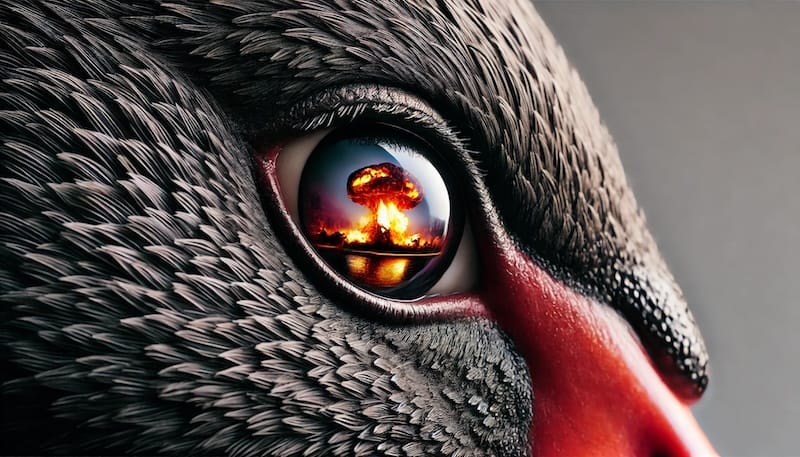
Why we'll always be terrible at predicting the future
In which we introduce a new project about predicting the future by saying it can't be done.
I predict that in the future, this exact moment will be studied and taught as a prime example of why you cannot predict the future.
Four weeks ago, predictions about the presidential race currently underway were premised on things like polls and trends and historical precedents. I don't remember any talking heads urging us to consider the possibility that Biden would fumble a debate so badly that his party would urge him to withdraw, and that he would, but not before Trump was lightly injured in an assassination attempt.
How can you work those eventualities into your model—much less the thing that's going to happen this week?
Most attempts to predict the future, or to write futuristic fiction, involve embiggening present trends, or invoking a major one-time event.
There's rising fascism in the world now? Imagine it taking over everything. Climate change is bad? Make it worse. We've gone to the Moon, so put us on Rigel IV. Cure death! Slam a meteor the size of Paris into Paris, launch a global face-eating pandemic, put us on the other side of the Singularity.
Now describe the resulting world. Just know you'll be wildly wrong.
The reason is the black swan.
Every one of those scenarios involves something generally predictable. There have been pandemics before. Meteors have slammed before, the climate has changed before. Biden has fumbled his words.
But those generalities don't do enough to help us anticipate how the actual future will unroll.
A black swan is any massively influential but unforeseeable event or development, something that profoundly impacts human life, sending ripples into our daily activities, our minds and hearts, our politics and economies, the world we envision for our children, even our sense of self.
Even a generally predictable event can blow up our conjectures. The black swan is often hatched in the details.
A meteor lands in Moscow instead of Antarctica. A bizarre ballot configuration in a single US county changes the result of a presidential election and a good chunk of subsequent human history. A liberal lion of the Supreme Court dies in the last days of a Republican president's term instead of the first days of his Democratic successor, cementing a conservative majority for a generation. An assassin's bullet is an inch to the left.
We can never control for this kind of thing, but we try anyway.
Imagine it's 1997. You've written an article predicting life in the US in five years. By most common measures, things are better than usual in 1997. Aside from some culture-war grandstanding, policymaking has been relatively stable and productive through the mid-90s. The budget is balanced, the cold war is over, relative peace prevails. There are growth trends in globalism, travel, and cultural exchange. Personal rights and freedoms are expanding. Technology is a tool of self-expression and convenience. So looking five years ahead, you confidently embiggen those trends, forecasting an increasingly peaceful and progressive era.
Five years later, it's 2002, and your piece is embarrassing. The budget has exploded in the wake of two new wars and a draconian security regime. Globalism is a four-letter word. Travel is severely curtailed. Technology is a tool of security and surveillance. Several new laws have rolled back privacy protections without blinking.
Even on a slender scale of five years, you missed your guess in almost every way—all because of a black swan event on September 11, 2001.
Although September 11th was specifically predicted by no one but Nostradamus, an eventual large-scale attack on the US by Islamic fundamentalists was easy to foresee. Place, time, and method, though—that unpredictability put us on a different timeline than a bio-agent ten years later in Seattle would have done. Black swan.
Consider social media. Few developments have influenced human life as deeply in the 21st century. It has changed our attention spans, creating an epidemic of dopamine addictions and crises of self-esteem. Lives have certainly ended because of it. The mis- and disinformation it facilitates have altered elections and thereby the outcome of world events. Uncountable unmasked or unvaccinated people are no longer alive because Mark Zuckerberg didn't go into music software development.
Yet no one quite saw social media coming until a very few years before it did.
Like many or most of these derailers of futurecasting, social media was unpredictable in part because its necessary precursors were also largely unpredicted. Although computers were developed in the early 20th century, the idea of a globally interconnected network through which everyone could quickly access and exchange information was not seriously suggested until JCR Licklider's visionary papers in 1960. Even as late as the late 1970s, the idea of personal computers in every home was met with skepticism, even within the field.
Only with the implementation of TCP/IP in January 1983 did a protocol exist allowing computers to communicate with each other across a vast network. By 1990, just 15 percent of US homes had a computer. Not until 2000 did a majority of US homes (51%) have one.
Three years later, Myspace. Six months after that, Facebook.
We can quibble over exactly where in that timeline social media became predictable, whether or not it was predicted. I wouldn't put it much before 1990 myself, which would make even the broad concept too young to drive by the time it left the driveway. Kind of a formula for disaster, yeah?
Good thing we've learned our lesson with AI. </s>
Artificial intelligence may enable us to run billions of scenarios, sketching out vast branching webs of possibility. But barring a still-unimaginable competence at parsing causes and effects to the beginning of time, we will forever have to deal with an unpredicted (and unpredictable) flock of inky cygnets.
